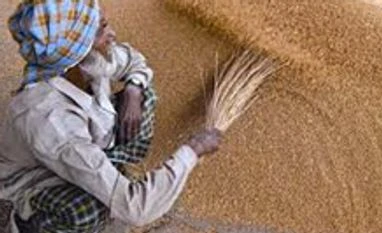Traders in Uttar Pradesh, Punjab and Haryana are increasingly being lured by the higher remuneration for wheat in Madhya Pradesh and Rajasthan.
For this year, the Centre had fixed the minimum support price of wheat at Rs 1,350 a quintal, against Rs 1,280 a quintal last year. To encourage higher acreage for wheat, the governments of Madhya Pradesh and Rajasthan have announced a bonus of Rs 150 per quintal over and above the minimum support price. Therefore, farmers in neighbouring districts are diverting wheat to mandis in Madhya Pradesh.
While the benefit of bonus in MP may not be available to outside farmers, farmers in bordering district of UP are selling wheat to Haryana and MP, as without bonus also they are getting better rates.
"As the procurement mechanism in Uttar Pradesh isn't very efficient, there is ample scope for traders to divert the wheat from the state to more lucrative destinations," said the representative of farmers' association. Market sources say as farmers rely on arhtiyas (agents), it is the traders who transport the wheat from one state to another and book profits.
Districts in Uttar Pradesh in the vicinity of Haryana access market yards in the latter. A trader said wheat in Uttar Pradesh was available at Rs 1,200-1,250 a quintal; even after adding freight charges, brokers earned profits, as Haryana purchased wheat at Rs 1,350 a quintal. Districts in Punjab and Haryana that are close to the Rajasthan border also divert wheat to Rajasthan, as a bonus of Rs 150 a quintal provides them with better margins.
This season, wheat arrivals across the country have been sluggish, owing to delayed rains and low temperatures during the ripening of grain. Food Corporation of India (FCI) sources said arrivals were staggered due to weather conditions.
Total procurement across India till the first week of April stood at 1.55 million tonnes (mt), according to FCI. Of this, 1.47 mt was procured in Madhya Pradesh. Procurement in the year-ago period stood at 1.92 mt, with Madhya Pradesh contributing 180,000 tonnes. R K Garg, president of the Confederation of Roller Flour Millers (north zone), said arrivals were likely to pick up in a week to 10 days.
For this year, the Centre had fixed the minimum support price of wheat at Rs 1,350 a quintal, against Rs 1,280 a quintal last year. To encourage higher acreage for wheat, the governments of Madhya Pradesh and Rajasthan have announced a bonus of Rs 150 per quintal over and above the minimum support price. Therefore, farmers in neighbouring districts are diverting wheat to mandis in Madhya Pradesh.
While the benefit of bonus in MP may not be available to outside farmers, farmers in bordering district of UP are selling wheat to Haryana and MP, as without bonus also they are getting better rates.
"As the procurement mechanism in Uttar Pradesh isn't very efficient, there is ample scope for traders to divert the wheat from the state to more lucrative destinations," said the representative of farmers' association. Market sources say as farmers rely on arhtiyas (agents), it is the traders who transport the wheat from one state to another and book profits.
Districts in Uttar Pradesh in the vicinity of Haryana access market yards in the latter. A trader said wheat in Uttar Pradesh was available at Rs 1,200-1,250 a quintal; even after adding freight charges, brokers earned profits, as Haryana purchased wheat at Rs 1,350 a quintal. Districts in Punjab and Haryana that are close to the Rajasthan border also divert wheat to Rajasthan, as a bonus of Rs 150 a quintal provides them with better margins.
This season, wheat arrivals across the country have been sluggish, owing to delayed rains and low temperatures during the ripening of grain. Food Corporation of India (FCI) sources said arrivals were staggered due to weather conditions.
Total procurement across India till the first week of April stood at 1.55 million tonnes (mt), according to FCI. Of this, 1.47 mt was procured in Madhya Pradesh. Procurement in the year-ago period stood at 1.92 mt, with Madhya Pradesh contributing 180,000 tonnes. R K Garg, president of the Confederation of Roller Flour Millers (north zone), said arrivals were likely to pick up in a week to 10 days.
)